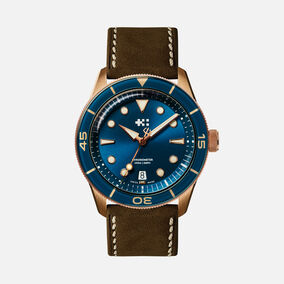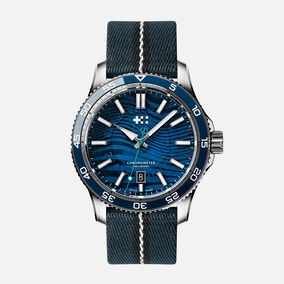CW Challengers Andy Hodgson and Rosalind Chaston have conquered the Atlantic in a tiny rowing boat – and they’re here to tell the story
When it comes to going the extra mile for good causes, you’d be hard pressed to beat the efforts of Christopher Ward Challengers, Andy Hodgson and Rosalind Chaston – AKA ‘Atlantic Escapade’.
On February 20th, the pair embarked from the Canary Islands to cross the Atlantic unassisted in a rowing boat to raise money for the RNLI and CW’s charity partner, Blue Marine Foundation.
After 46 days, 22 hours and 30 minutes at sea, they arrived at their destination, Port St Giles in Barbados. Now fully rested and recovered, they’re here to discuss their fantastic voyage.
Hi guys! Congratulations on completing your mission. What was it like when you crossed the finish line?
Andy: We arrived at Port St Giles on Saturday of Easter Weekend, which was good timing.
Rosalind: My mum, dad and sister had come out, and Andy’s dad, too. We rowed into a restaurant so there were quite a few diners around. When we stepped off the boat the whole restaurant started applauding!
Were you tired?
R: On the first night we arrived we slept for 15-and-a-half hours straight, and we’re only getting our land legs back now.
A: We’ve also had to get the boat packed and cleaned for it to be sent back to the UK. It’s not all glamour, hammocks and cocktails!
Going back to your departure in February. How did it feel?
R: We left at 8pm, so it was dark. It felt quite normal when we set off as we were in the shelter of the island but after an hour the waves started picking up. When we first lost sight of shore I thought, “I’ve got a long road ahead of me.”
A: There was a lot of work to be done on the Canary Islands as we’d found a small crack in the nose of the boat. This took time, and we were losing the weather ‘window’. Our families had been there to see us off but because of the delay they had to return to the UK. When we left there were just a couple of guys to wave to.
“We spent two weeks soaking wet!”

Was there a team helping with navigation?
A: We had digital charts on boards, and satellite comms so we could be in touch with our weather router. He’d give us the best direction for the day and tell us about any approaching storms. The trade winds didn’t set in well this year, so there were a lot of winds coming from the north, rather than the east – which is what would normally power us from behind. We wound up just a 100 miles off Africa before we could turn west toward Barbados.
Did it get scary?
R: Yes. For the middle section of the voyage there was a huge low pressure system sitting in the mid-Atlantic. That sent big swells in our direction, so we’d row for eight or 10 strokes, and then get smacked with a huge wave. For 10-14 days that was affecting us.
A: When you get hit sideways, it stops you making any momentum forward – and you get covered in water. We spent two weeks soaking wet! One night it was particularly bad, and we battened down the hatches and locked ourselves in the cabin. We got some shut-eye, and at one point there was a huge noise and Rosalind ended up on top of me – we had been side by side. This meant the boat was on its side.
That doesn’t sound great…
A: Once it righted itself, I said, “It’s OK, don’t panic.” And then put all my gear on and went out to see what the state of the boat was. The oars had been ripped out, and the deck was a real mess – I had to clear it up. When I opened the cabin door again, Rosalind was snoring!
R: I can sleep through anything.
A: I will say one thing: When the waves were big, Rosalind took the speed record in the boat, doing 16 knots down the side of a 20 ft wave. It was utter madness! Normally we’re rowing at three or four knots.
R: I was holding on for dear life!
What sort of wildlife did you encounter?
R: For the first two weeks we saw dolphins every day – and not always the same ones. You get bioluminescence which lights up as you row through it. One night, the dolphins were playing alongside the boat, and as they swam through the bioluminescence, their entire bodies just flashed!
A: They glowed green – it was incredible. You can see where those old mariner’s tales came from.
R: We also saw turtles, a couple of sharks – they’re pretty shy – and some marlin. One stalked us for an hour! My favourite was this seabird, a little brown petrel: it landed on the boat every day.
“I was holding on for dear life!”

When did you feel you were coming to the end?
A: The weather started to ease in the fifth week, around Day 40. Even at that stage, there was no sight of land, so we didn’t switch off until the night before, when we could see the glow from Barbados’s lights.
R: We had sessions with a sports psychologist before we went. A lot of the work we did was to break down the challenge into chunks – ie: the first 100 miles, the first 1,000 miles, the halfway point. At one stage, the nearest humans were 408 km above us in the International Space Station!
Did you get on?
A: Well, Rosalind didn’t throw me overboard.
R: It was hard. After about three days, Andy opened the cabin door, and said: “I don’t want to alarm you but I can’t see.”
A: That was a bit scary – the words on the charts started to blur, and my sight was deteriorating. Luckily, we had doctors on the satellite team. They had a list of our medication, and it turned out it was a seasickness patch we’d taken with us. Within 12 hours of taking it off I started to see better and was back to normal by the end of the week.
R: I still made him row his shifts!
A: She’s brutal.
You were both wearing C60 Sapphires. How did they perform?
R: Fantastically well. You try not to keep too much of an eye on the time when you’re starting out, but it’s nice to glance at it when you’re coming to the end.
A: Our watches were on UTC (Universal Time), then our weather router switched to British Summer Time. Later, we moved to Barbados Time – we had three time zones going at once! But we kept the watches on UTC as a connection to home. At one stage, the moon was rising at 2pm according to the watch!
R: One of our favourite bits was seeing the moon rise and set every day. That connection with the night sky was my favourite part. We left on the new moon, so we could time the row using it: when the full moon came around we knew we’d been out for two weeks.
Finally, are you planning another journey?
R: Yes! Within 30 hours of being on dry land, we were already missing life on board.
A: Human-powered adventure is something we plan to keep on doing. This is just the start!
Donate below
justgiving.com/team/atlanticescapade
“The connection with the night sky was my favourite part”


Sign up to Loupe magazine
Loupe is Christopher Ward’s quarterly in-house magazine. If you want to know what’s happening at CW (and you love great journalism), this is where to start. Alternatively, you can read all our back issues on your computer, tablet or phone.
Order your free copyRead Loupe online



